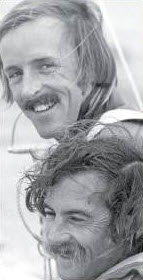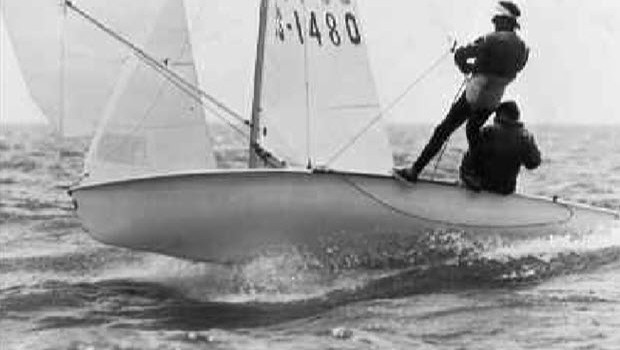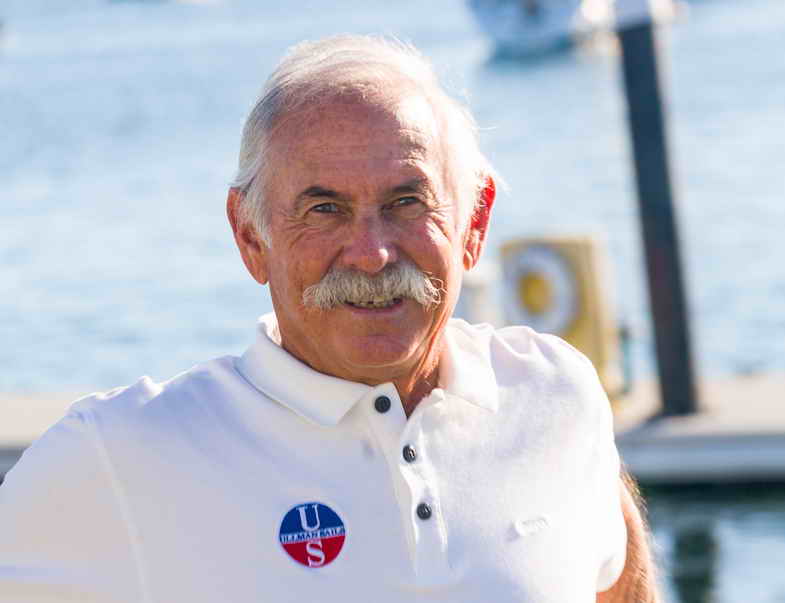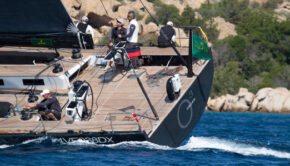Dave Ullman: The Magic Revealed
Published on October 21st, 2015
Growing up sailing dinghies in Southern California during the seventies and eighties, guys like Tom Linskey and Dave Ullman were the measure of greatness. When they later teamed up in the 470 class, the world met greatness too. In the November issue of Seahorse magazine, an interview of Ullman is written by Linskey, who also provided this background report…
 Before I sailed with Dave I was, like everyone in Southern California, in awe of him. I’d never heard of him losing a race or a series. He seemed to float above the setbacks – bad regattas, fluctuating boatspeed, protests, entanglements on the starting line or at marks – that blindsided other sailors.
Before I sailed with Dave I was, like everyone in Southern California, in awe of him. I’d never heard of him losing a race or a series. He seemed to float above the setbacks – bad regattas, fluctuating boatspeed, protests, entanglements on the starting line or at marks – that blindsided other sailors.
And there were mysteries about Dave. We’d heard tales of him sailing blindfolded as a child, never sure if they were true or just part of the lore. On top of a kind of spooky always-on boatspeed and (we assumed) a wind-predicting intuition, Dave was a sailmaker, so he worked a special kind of voodoo. Because the sails he built were fast, competitors feared that he really did know the secret of what made sailboats go.
The rest of us could only guess, and fumble around, and sometimes we’d go fast, other times slow, and we were never sure why. So when I joined Ullman Sails at the Newport Beach loft in 1977 to make sails, Dave quickly drafted me – I was tall, thin, and had 470 experience – to crew for him in the 470. Finally, I thought, I’m going to step behind the veil of the Ullman magic.
After sailing a few regattas with Dave I realized that the magic involved a lot of work. Not physically, but mentally. Dave trained me to continually report – he wanted the location and movements of every boat in play, he wanted the wind (shifts, velocity, puffs, streaks, lines, local effects), and he wanted our speed and height and that of the other players.
Dave’s eyesight was poor – one of my jobs was to describe where the next mark was – but, paradoxically, he seemed to know everything that was going on in every part of the racecourse. It was as if he were zoomed out, hovering above as the race unfolded, cool and detached, analyzing. That meant that there were two of us looking around which, tactically, was twice as good as one.
While steering, Dave never seemed to be concentrating hard, if at all. But the boat was always going fast. Later, of course, I realized that the zoomed-out, going-fast-while-looking-around skill came from his father’s coaching with a blindfold.
Because he kept emotion out of his racing, Dave never became stressed. He didn’t yell, no matter what happened. Well – the one time Dave Ullman did let out a blood-curdling scream came during a high-speed spinnaker wipeout (we later identified a cavitation issue with the rudder blade). Dave’s calm, patient, single-minded demeanor paid off in surprising ways; Dave could sail forever, it seemed, in dirty air, if that was the tactically smart thing to do. Bad air didn’t rattle him. But making an emotion-driven decision that took us in the wrong direction did bother him.
When we got deeper into international competition I learned the Ullman System – the conservative, play-the-odds, play-the-fleet, no-bad-races philosophy. When we traveled to a big regatta in Europe, Dave kept ‘the program’ sacrosanct. If, say, a French team blew us away in a pre-regatta tuning session, Dave was careful not to get ‘spun’ and start changing our setup. ‘We don’t have to be the fastest boat,’ he’d tell me. ‘We don’t have to win a race. If we round the first mark in the top-20, I’m happy.’
The first handful of boats at the top mark, by definition, had likely taken unacceptable risks to get there – they’d punched the starting line, or gone deep to a corner. Such risk-taking, race-winning behaviour inevitably blew up their series.
In a 70-boat worlds’ fleet we’d usually round the first mark in the high teens or low-20s, the leaders just dots ahead. And we’d finish, typically, in the top five. I’d never seen anyone click off more boats in a race. Each comeback was the Ullman System at work: analyzing, calculating the odds, chipping away at boats ahead as they overextended or gambled. We never won a race in a 470 worlds. But we were the first team to win three world championships.
In my 49 years of sailing I’ve never worked harder in a race than in any of the races – any leg of any of the races – that I sailed during eight years with Dave. I can vouch that the Ullman System works. And I can report that the Ullman magic is not really magic, after all. But, really, it is.
NOTE: This column was re-published with permission from Seahorse magazine (November 2015). Information about Seahorse can be found HERE.











 We’ll keep your information safe.
We’ll keep your information safe.